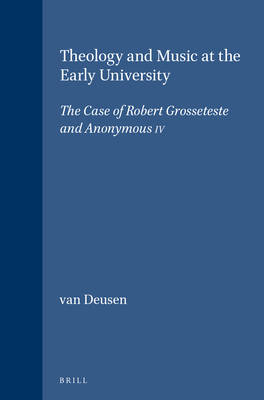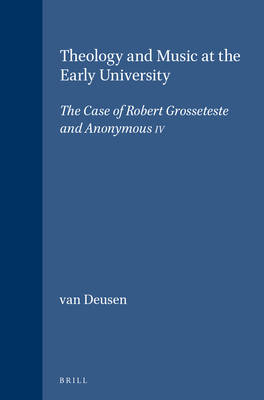
- Retrait gratuit dans votre magasin Club
- 7.000.000 titres dans notre catalogue
- Payer en toute sécurité
- Toujours un magasin près de chez vous
- Retrait gratuit dans votre magasin Club
- 7.000.0000 titres dans notre catalogue
- Payer en toute sécurité
- Toujours un magasin près de chez vous
Theology and Music at the Early University
The Case of Robert Grosseteste and Anonymous IV
Nancy van Deusen
245,95 €
+ 491 points
Description
At the climax of one of his most important and comprehensive works, De cessatione legalium, the thirteenth-century theologian and natural philosopher, Robert Grosseteste, uses a musical example to make a point fundamental to the treatise. Music, using time as its material, located between the abstract and the concrete, served as an analogy, thus making a difficult philosophical concept perceptible. In using music as an analogy, Gorsseteste drew upon a long tradition established by Augustine, confirmed within the new Aristotelian reception, and a newly-translated Platonic dialogue. But the first rector of the University of Oxford was also demonstrating music's place within the curriculum of the early university, namely, as a ministry discipline, efficiently and efficaciously exemplifying traditional Augustinian, as well as new Aristotelian principles.
This book unites the most important theological-philosophical subjects discussed by Robert Grosseteste throughout his prodigious output, with those exemplified by an anonymous contemporary English writer on music. The work shows how music collaborated with the other liberal arts, operating within the early university curriculum as a ministry discipline. Music made accessible through the figurae of its notation, and through sound, otherwise nearly unapproachable, new Aristotelian concepts. The influence was reciprocal in that new Aristotelian tools and conceptualization greatly influenced music notation and style. Music theory has been studied in isolation, as pertaining only to music. This study is the first to relate music of the early thirteenth century to its intellectual context, overturning dogma, uncritically accepted since the beginning of this century, concerning so-called "modal rhythm," and showing how "contrary motion," rather than forming a musical convention, demonstrated a key Aristotelian concept.
This book unites the most important theological-philosophical subjects discussed by Robert Grosseteste throughout his prodigious output, with those exemplified by an anonymous contemporary English writer on music. The work shows how music collaborated with the other liberal arts, operating within the early university curriculum as a ministry discipline. Music made accessible through the figurae of its notation, and through sound, otherwise nearly unapproachable, new Aristotelian concepts. The influence was reciprocal in that new Aristotelian tools and conceptualization greatly influenced music notation and style. Music theory has been studied in isolation, as pertaining only to music. This study is the first to relate music of the early thirteenth century to its intellectual context, overturning dogma, uncritically accepted since the beginning of this century, concerning so-called "modal rhythm," and showing how "contrary motion," rather than forming a musical convention, demonstrated a key Aristotelian concept.
Spécifications
Parties prenantes
- Auteur(s) :
- Editeur:
Contenu
- Nombre de pages :
- 244
- Langue:
- Anglais
- Collection :
- Tome:
- n° 57
Caractéristiques
- EAN:
- 9789004100596
- Date de parution :
- 01-10-94
- Format:
- Livre relié
- Format numérique:
- Genaaid
- Dimensions :
- 165 mm x 240 mm
- Poids :
- 580 g

Les avis
Nous publions uniquement les avis qui respectent les conditions requises. Consultez nos conditions pour les avis.






